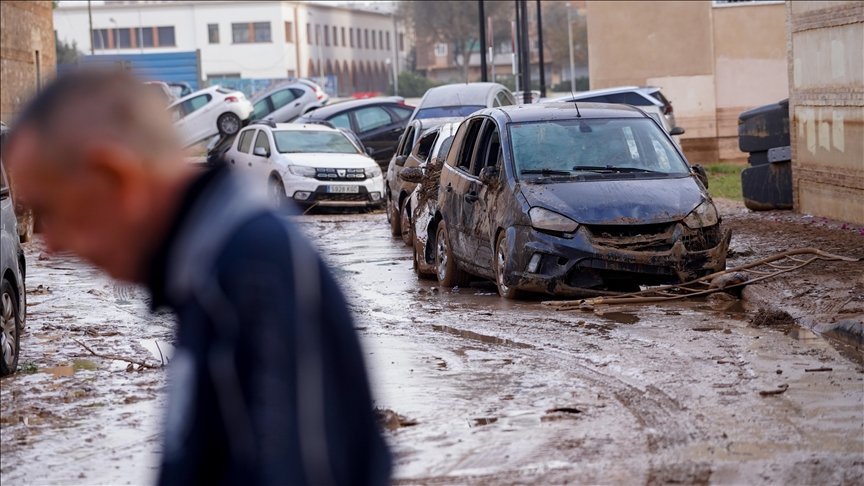OVIEDO, Spain
Search and rescue efforts continued in Spain on Thursday after an unprecedented storm killed at least 158 people and caused widespread destruction, AA reported.
At least 155 people lost their lives in Valencia, the hardest-hit region, according to the region's government. But deaths have also been reported in the provinces of Cuenca, Albacete, and Malaga.
Earlier in the day, Defense Minister Margarita Robles said authorities still could not offer a precise number, but that “many people” remained missing.
Around 1,000 soldiers were deployed on Thursday, and their main priority is finding the missing.
“We know that in places like Paiporta and Massanassa, there might be people in garages, in basements -- people who went out to find their vehicles,” Robles said in an interview with broadcaster Telecinco.
The worst of the storm hit Tuesday, when nearly a year’s worth of rain fell in a matter of hours, causing flash floods, river overflows, and streets in towns and cities to turn into powerful rivers.
The storm’s intensity caught thousands off guard. Residents, many returning from work, were rapidly trapped in vehicles. Others became stranded in their homes, workplaces, restaurants, or shopping centers, desperately awaiting rescue as the waters rose.
The government of Valencia sent an emergency alert to phones late Tuesday evening, asking people to stay indoors or seek high ground, when much of the damage had already been done.
“The alarm sounded when the water was past my waist,“ Joan San Saloni, a resident in the town of Paiporta, told Spanish broadcaster RTVE. “If it would have gone off earlier, saying don’t leave home, people wouldn’t have gone to get their cars… if we would have known, there wouldn’t have been so many deaths.”
Emergency services were quickly overwhelmed by the volume of calls, unable to reach the hardest-hit areas. Saloni described how he was calling for hours to no avail as he heard people crying for help in the town.
Damage to infrastructure
Aside from the human tragedy, there has been incalculable damage to infrastructure.
Thousands of households still do not have connections to electricity or drinking water. They are also completely isolated due to road and rail closures.
In a press conference, Spain’s Transport Minister Oscar Puente said the popular high-speed rail line between Madrid and Valencia will be closed for at least two to three weeks. Two tunnels that it passes under are severely damaged, and workers will have to completely reinstall the rail line, he said.
Some local rail lines are in even worse condition, which he estimates will take “many months” to repair.
Meanwhile, around 80 kilometers (50 miles) of highway in Valencia has been severely damaged. “Mountains of cars” continue to line roads that are key for the area’s connectivity, Puente added.
Political finger-pointing has also begun over one of the worst natural disasters in Spain’s history.
Opposition leader Alberto Nunez Feijoo held a joint press conference with the conservative leader of Valencia on Wednesday, saying that although the regional government was responsible for issuing the alert, it was acting on information provided by central government agencies.
However, Spain’s meteorological agency AEMET issued a red alert warning of “extreme danger” on Tuesday morning, around 12 hours before the local government sent a warning to phones.
Storm continues
The historic storm has decreased in intensity but continues to drench parts of Spain.
“Please, the storm continues. Please follow the recommendations of emergency services. Right now, the most important thing is saving lives,” said Prime Minister Pedro Sanchez in a speech from Valencia.
More flooding occurred in the province of Castellon on Thursday, which was put on red alert for heavy rainfall. Catalonia has also activated red alerts for areas in the south of the region.
On Wednesday, flash floods were seen in other areas of the country like southern Andalusia, which is still receiving rain on Thursday.
Spain has declared three national days of mourning.
The EU headquarters on Thursday lowered their flags to half-mast.
“The floods in Spain are not only a national tragedy. It’s also a European one. As such, it will receive a European response,” EU Commission President Ursula von der Leyen said on X.
